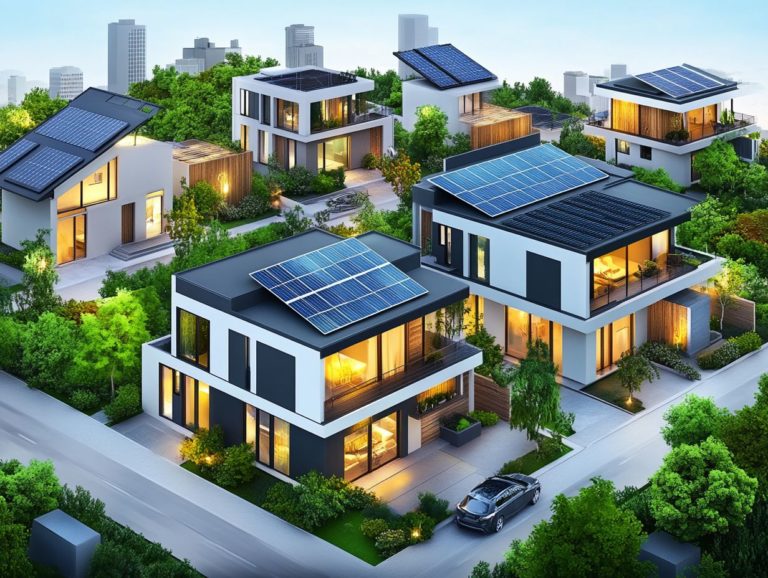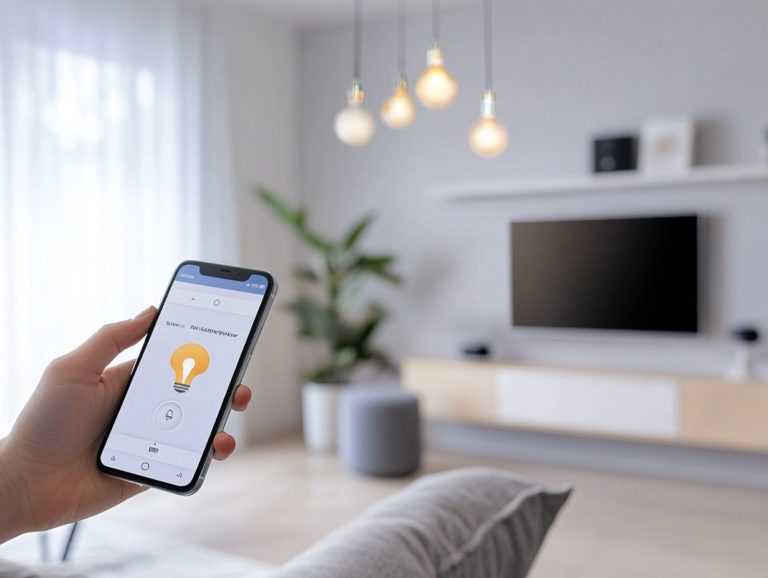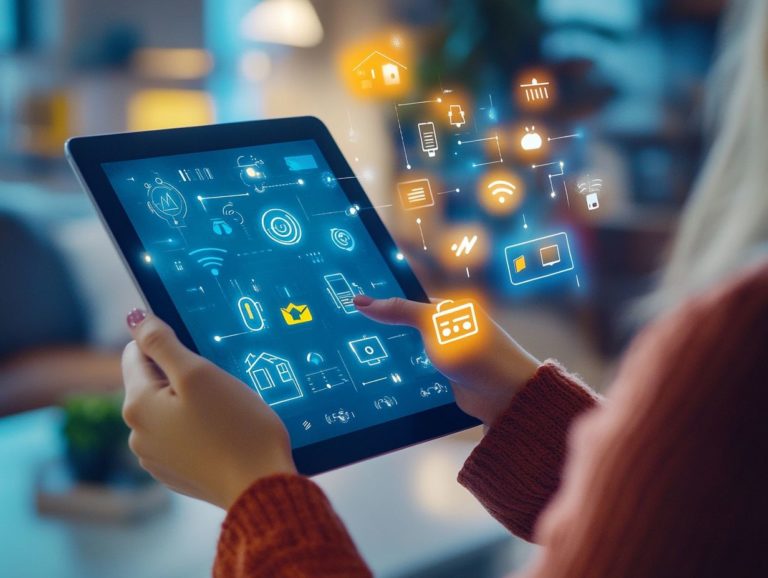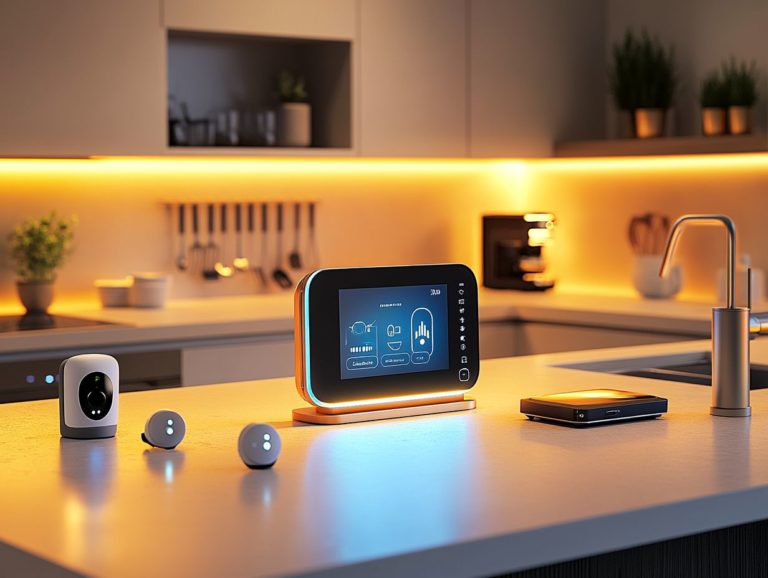The Evolution of Smart Home Technology
Smart home technology has reshaped the way you live. It brings unparalleled convenience, enhanced security, and remarkable efficiency into your daily routine.
From early innovations that paved the way for connected devices to the sophisticated integrations we see today, the story of smart homes is exciting and full of innovation.
This article delves into the evolution of these technologies, examining their profound impact on daily life and what the future may hold. It also highlights essential considerations for anyone contemplating the adoption of smart home systems, including cost implications and privacy concerns.
Explore the transformative power of smart homes and discover how they are redefining the fabric of your life!
Contents
- Key Takeaways:
- Early Innovations in Smart Home Technology
- Advancements in Smart Home Technology
- The Impact of Smart Home Technology on Daily Life
- The Future of Smart Home Technology
- Considerations for Smart Home Adoption
- Frequently Asked Questions
- What is the Evolution of Smart Home Technology?
- What are the main features of Smart Home Technology?
- How has Smart Home Technology evolved over the years?
- What are the benefits of Smart Home Technology?
- What are some examples of Smart Home Technology?
- How is Smart Home Technology impacting our daily lives?
Key Takeaways:
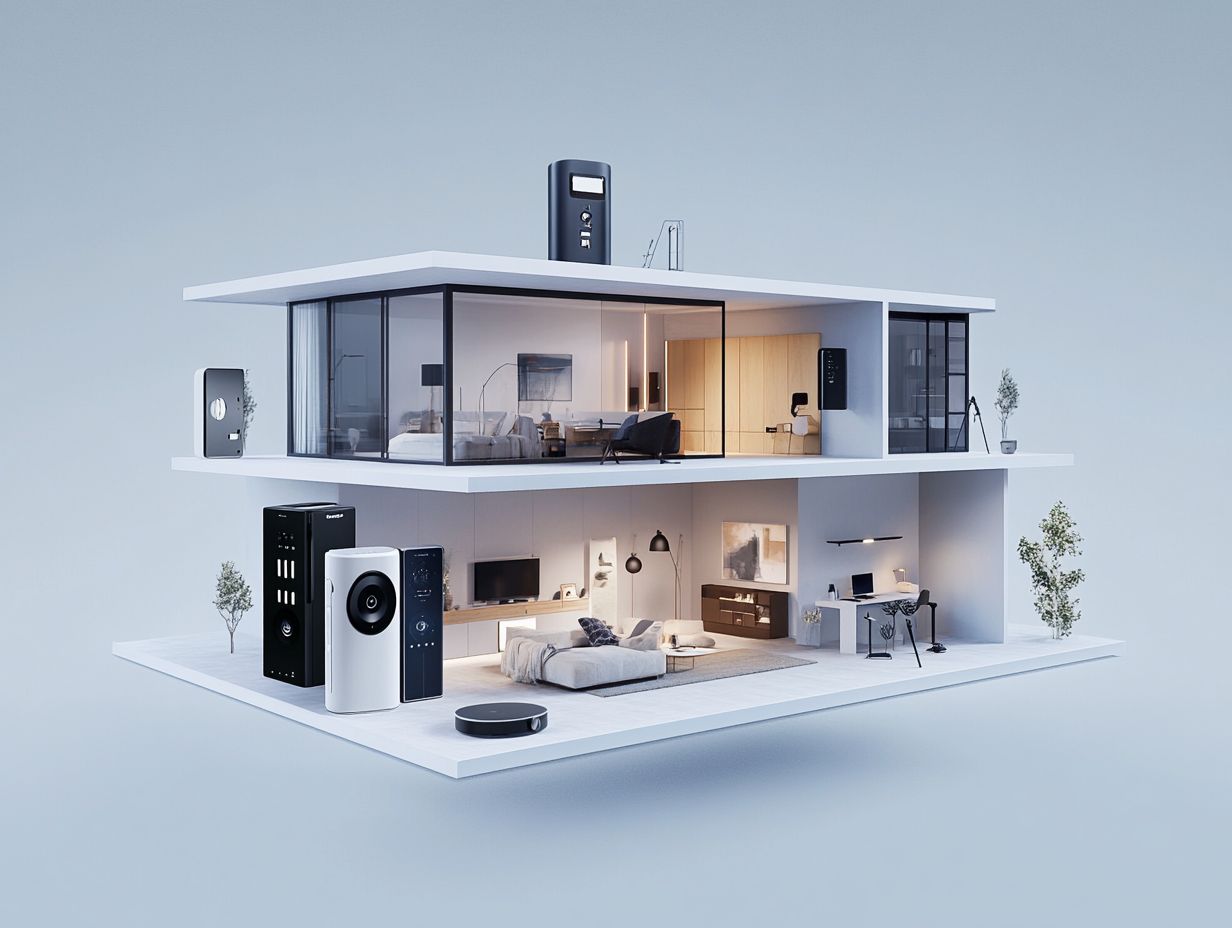
- Smart home technology has come a long way from its early innovations to its current integration of artificial intelligence and expansion of connected devices, making daily life more convenient and efficient.
- While the benefits of smart home technology are significant, be sure to weigh the costs and privacy concerns before jumping into smart home systems!
Definition and Brief History
The concept of a smart home seamlessly integrates advanced technology with digital devices and interconnected systems, transforming your living environment into a hub of convenience and sophistication.
This modern approach not only redefines your comfort and efficiency but also mirrors a broader societal shift towards technology-driven lifestyles.
Key milestones, such as the first thermostats that could be set to adjust the temperature automatically, introduced in the 1980s, and the explosion of internet-enabled gadgets in the 21st century, have been pivotal in this evolution.
As technology has progressed, smart appliances have emerged, offering innovative solutions to everyday tasks from laundry machines that optimize water usage to refrigerators that keep tabs on food freshness.
This ongoing evolution highlights the significance of smart homes in enhancing safety, reducing energy consumption, and ultimately paving the way for the rise of smart home communities to create a more sustainable future.
Early Innovations in Smart Home Technology
Early innovations in smart home technology have set the stage for what you now recognize as the modern smart home, with pioneering inventions from remarkable figures like Nikola Tesla.
In the early 20th century, devices such as the ECHO IV showcased the immense potential for home automation. Advancements in technology designed to help older adults started to meet the needs of this growing group.
These developments underscore the pivotal role of technology in enhancing comfort features and ensuring user accessibility within residential spaces.
First Generation Devices and Systems
The first generation of smart home devices and systems represented a groundbreaking venture into interconnected living spaces, showcasing trailblazing products from brands such as Control4 and Siemens. These early innovations laid the groundwork for home networking and automation, allowing you to control various consumer gadgets from afar.
With a keen emphasis on user convenience and comfort, the stage was set for the evolution of more sophisticated smart home solutions. These devices introduced functionalities like automated lighting control, programmable thermostats, and basic security systems, dramatically transforming how you interact with your living environment. To stay updated, check out the latest trends in smart homes.
You began to appreciate the ease of managing your home remotely, adopting habits that prioritized efficiency and enhanced security. For example, a simple smartphone app could now adjust your home s temperature or keep an eye on security cameras, highlighting the significant impact these advancements had on your daily life.
As this initial wave of smart technology gained momentum, it paved the way for more integrated systems, weaving technology seamlessly into the fabric of everyday living.
Advancements in Smart Home Technology
Advancements in smart home technology have transformed how you engage with your living spaces. Staying updated with the top smart home trends for 2024 can enhance both energy efficiency and user experience through cutting-edge smart appliances and automation systems.
Defined by the seamless integration of artificial intelligence and connected devices, today’s homes are evolving into intelligent environments that prioritize comfort and energy conservation.
As technology progresses, smarter, more sustainable living becomes a reality within your reach.
Integration of Artificial Intelligence
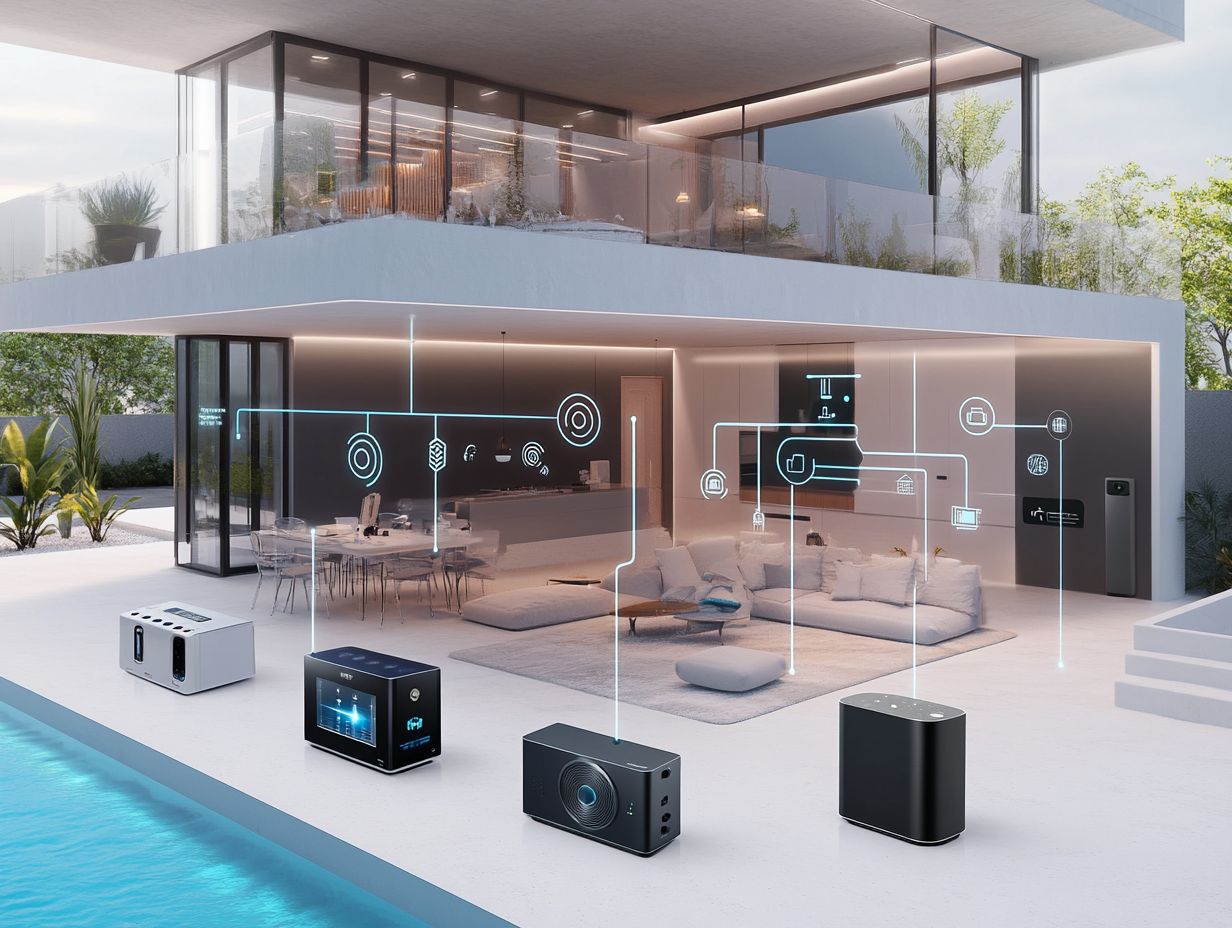
The integration of artificial intelligence (AI) in smart home technology has elevated the functionality and interactivity of smart devices. With advanced capabilities like voice recognition, AI-driven systems adapt to your preferences, enhancing your comfort and convenience.
This represents a major milestone in creating living environments that respond intuitively to your needs. As intelligent systems become more sophisticated, anticipate enhanced security features that learn and predict potential threats.
Smart cameras adjust settings based on lighting conditions, while security alarms verify any unusual activities through conversation.
AI also plays a crucial role in energy efficiency, optimizing heating and cooling schedules in real time based on occupancy patterns. This comprehensive approach ensures seamless integration of your devices, allowing you to manage your home with minimal effort.
With technology acting as a supportive partner in your everyday life, the future of smart homes looks promising.
Expansion of Connected Devices
The recent surge in connected devices has transformed the smart home market, providing a diverse array of technologies that enhance home connectivity. As consumer electronics weave deeper into your daily life, the demand for connected devices has skyrocketed, simplifying how you manage your environment.
This trend shows the vital importance of interoperability among smart devices. Efficiently overseeing your home and enjoying improved accessibility is now easier than ever.
With a growing selection of smart appliances and security systems, your modern living experience is evolving beyond mere convenience. You want a cohesive ecosystem where devices not only function but also communicate effectively with one another.
Imagine controlling your lighting, heating, and security systems all from a single application. Enhanced interoperability elevates your user experience, allowing devices to work together in perfect harmony.
This shift has led to increased market demand, as you become more willing to invest in technology that simplifies your life and fosters deeper connections. Consequently, manufacturers are prioritizing compatibility, aiming for a more unified smart home landscape.
The Impact of Smart Home Technology on Daily Life
Smart home technology can really change how you live every day. It elevates convenience and energy savings with innovative features designed for efficient living.
By integrating smart home elements like remote monitoring and automated systems, you gain exceptional control over your environment. This technological advancement simplifies daily tasks and promotes a more sustainable lifestyle, reflecting the increasing demand for smart solutions that meet contemporary living needs.
Don’t miss out on the chance to make your home smarter and more efficient! Explore the latest in smart home technology today!
Convenience and Efficiency
Convenience and efficiency lie at the heart of smart home technology. They allow you to streamline everyday tasks effortlessly with the aid of smart devices and automated systems.
Committing to efficiency simplifies your life. It also encourages sustainable living.
Consider many smart devices like smart thermostats, lighting systems, and home security cameras that work together seamlessly. They deliver an ease of living once thought to be purely futuristic.
For example, smart thermostats learn your preferences and automatically adjust the temperature. This saves energy during times when your home is less occupied.
Lighting systems can be programmed to turn on or off based on your schedule or occupancy. This ensures that energy is used optimally.
Integrated security systems provide real-time monitoring and alerts directly to your smartphone, giving you peace of mind without sacrificing convenience.
Together, these technologies illustrate how smart home solutions can transform your living space. They create not only a comfortable haven but also an energy-efficient environment, making your daily routines more effortless than ever.
Security and Safety
Security and safety in your smart home reach new heights through advanced security systems and features that provide real-time remote monitoring.
With interconnected devices working seamlessly, you can ensure your property is well-protected against intrusions and emergencies.
The ability to manage your security systems from afar brings a sense of peace. This transforms your smart home into a secure haven for modern living.
Beyond the basics of alarms and sensors, innovative solutions like smart cameras, which use artificial intelligence (AI) to recognize faces, send alerts only when it truly matters.
Automation features allow you to establish schedules and routines that simulate active occupancy. This effectively deters would-be burglars.
With integration into voice-activated assistants, you can effortlessly control your security systems, even when you’re not at home. This harmonious fusion of technology enhances your safety and enables you to take proactive steps in safeguarding your loved ones and property.
The Future of Smart Home Technology
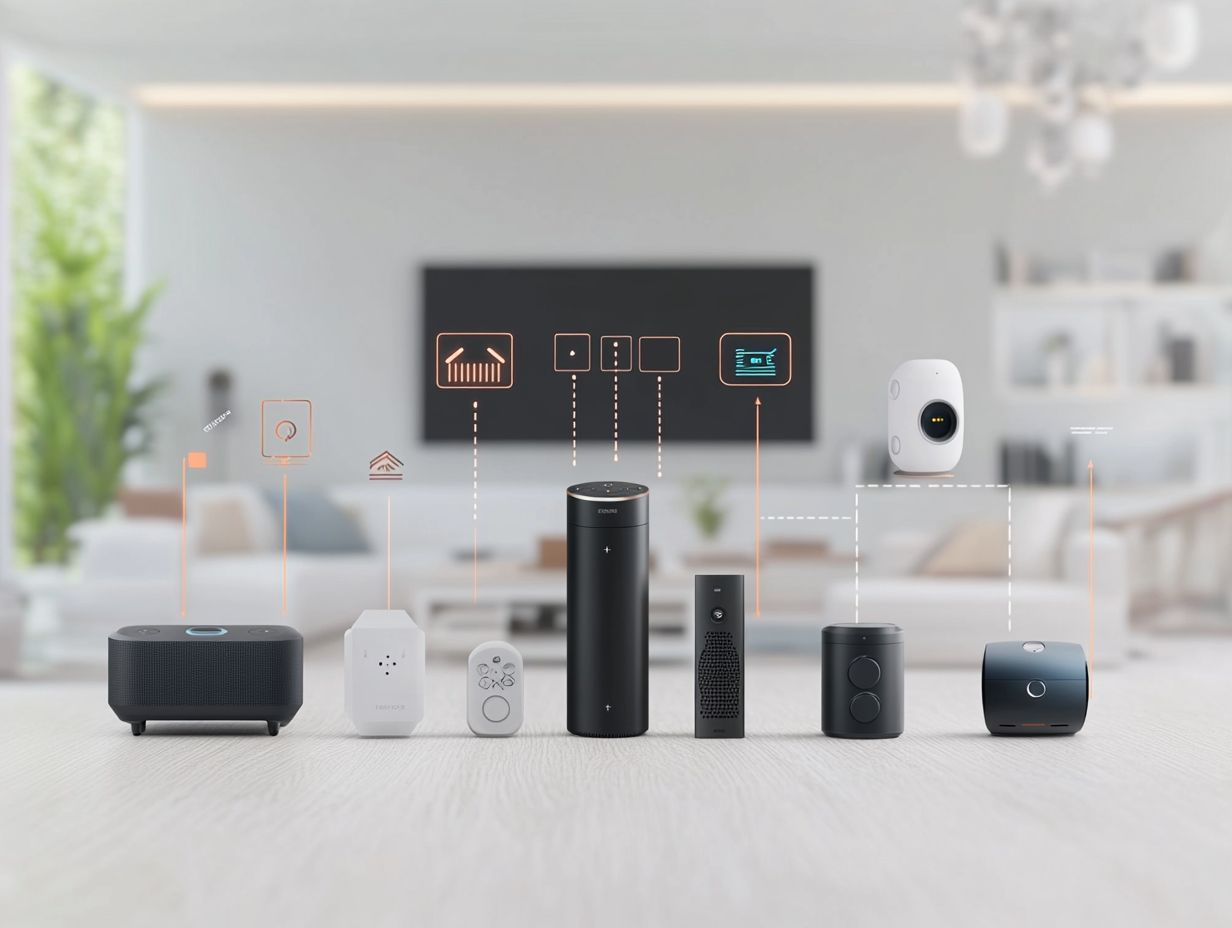
Get ready! The future of smart home technology is bursting with thrilling possibilities. Fueled by innovative advancements and evolving market trends, the impact of smart homes on daily life establishes smart solutions as vital elements of contemporary living.
As consumer gadgets grow ever more sophisticated, you will notice an increasing focus on energy efficiency and sustainable practices that resonate with your values.
The trajectory of smart home innovations indicates a sustained expansion of smart devices and automation technology. This elevates your user experience and connectivity within homes across the globe.
Predictions and Potential Developments
Predictions for the future of smart home technology suggest you’ll see a remarkable surge in the adoption of smart technology and home automation solutions.
As consumer electronics evolve, you can expect to encounter more advanced devices that learn your preferences and optimize your home management.
The focus on seamless integration and convenience will drive innovations aimed at enhancing your overall smart home experience.
Experts anticipate a rise in AI-driven applications that will not only allow your devices to communicate with one another more effectively but also to anticipate your needs through data analysis.
This could lead to a more intuitive interface where your home systems adjust lighting, temperature, and security based on your behaviors and preferences.
The integration of voice recognition and digital assistants is set to redefine how you interact with your home. This makes automation accessible to a broader audience.
Exciting trends show that sustainability will be key! Smart devices will likely prioritize energy efficiency and waste reduction, aligning perfectly with eco-conscious values you may hold.
Explore these advancements today and transform your home into a smart sanctuary!
Considerations for Smart Home Adoption
When you think about adopting smart home technology, several factors demand your attention. These include cost, privacy concerns, and user accessibility.
While the advantages of smart solutions are significant, it’s crucial to carefully weigh these considerations to make informed decisions about integrating smart devices and systems into your home.
Grasping the delicate balance between investment and security is essential for ensuring a smooth transition to a more intelligent living environment.
Cost and Privacy Concerns
Cost and privacy concerns play a significant role in your decision to adopt smart home technology. As you consider this leap, it s essential to weigh the financial investment alongside the implications for data security.
While smart homes promise unparalleled convenience and efficiency, the associated costs might serve as a barrier for many. It’s important to think about how your data will be used when addressing privacy concerns regarding data collection and usage.
Investing in smart home devices usually requires an upfront payment, which can vary greatly depending on the technology you choose. You may not fully realize the long-term savings attainable through energy efficiency and automation, which can substantially reduce your monthly utility bills.
Manufacturers are increasingly aware of privacy issues. Many are stepping up with robust security measures to protect personal data. By prioritizing transparency in their data handling practices, the smart home industry can ease your concerns and pave the way for broader acceptance of these innovative technologies.
Frequently Asked Questions
What is the Evolution of Smart Home Technology?
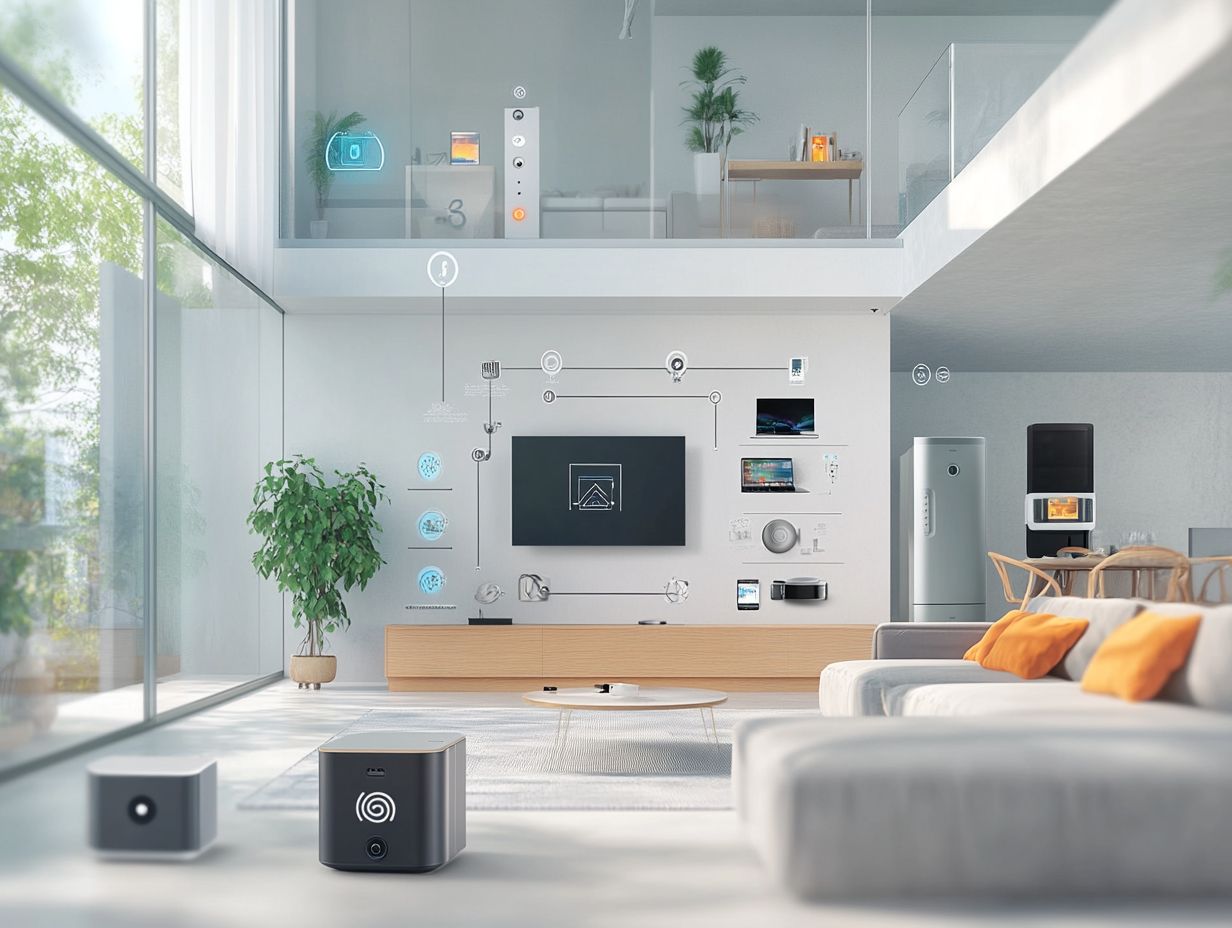
The Evolution of Smart Home Technology refers to the development and advancement of technology in homes, allowing for automation and remote control of various household functions and appliances, including the latest innovations in smart home technology.
What are the main features of Smart Home Technology?
The main features include remote access and control, voice commands, energy efficiency, security and surveillance, and integration with other smart devices.
How has Smart Home Technology evolved over the years?
Smart Home Technology has evolved from simple remote control devices to highly sophisticated, interconnected systems. To understand what smart home technology is, these systems now incorporate artificial intelligence as a way for devices to learn from experience and machine learning for more efficient and personalized functions.
What are the benefits of Smart Home Technology?
Smart Home Technology offers numerous benefits: convenience, energy and cost savings, increased security, and a more comfortable living experience.
What are some examples of Smart Home Technology?
Examples include smart thermostats, smart lighting systems, smart appliances, voice assistants, and security systems with remote access and surveillance features.
How is Smart Home Technology impacting our daily lives?
Smart Home Technology is making our daily lives more convenient, efficient, and secure by automating tasks and saving energy and resources. It provides greater control and access to our homes, even when we are away.

